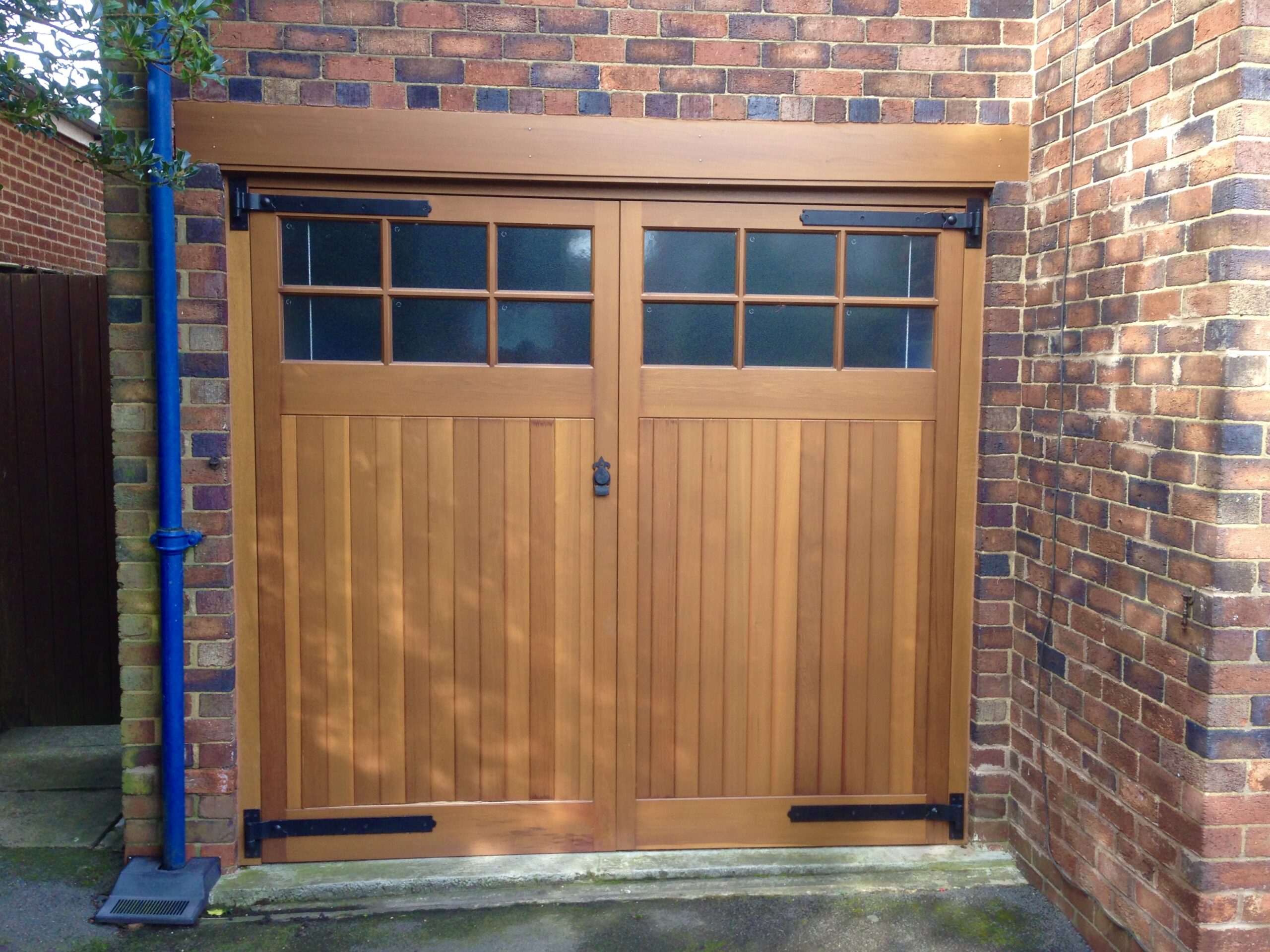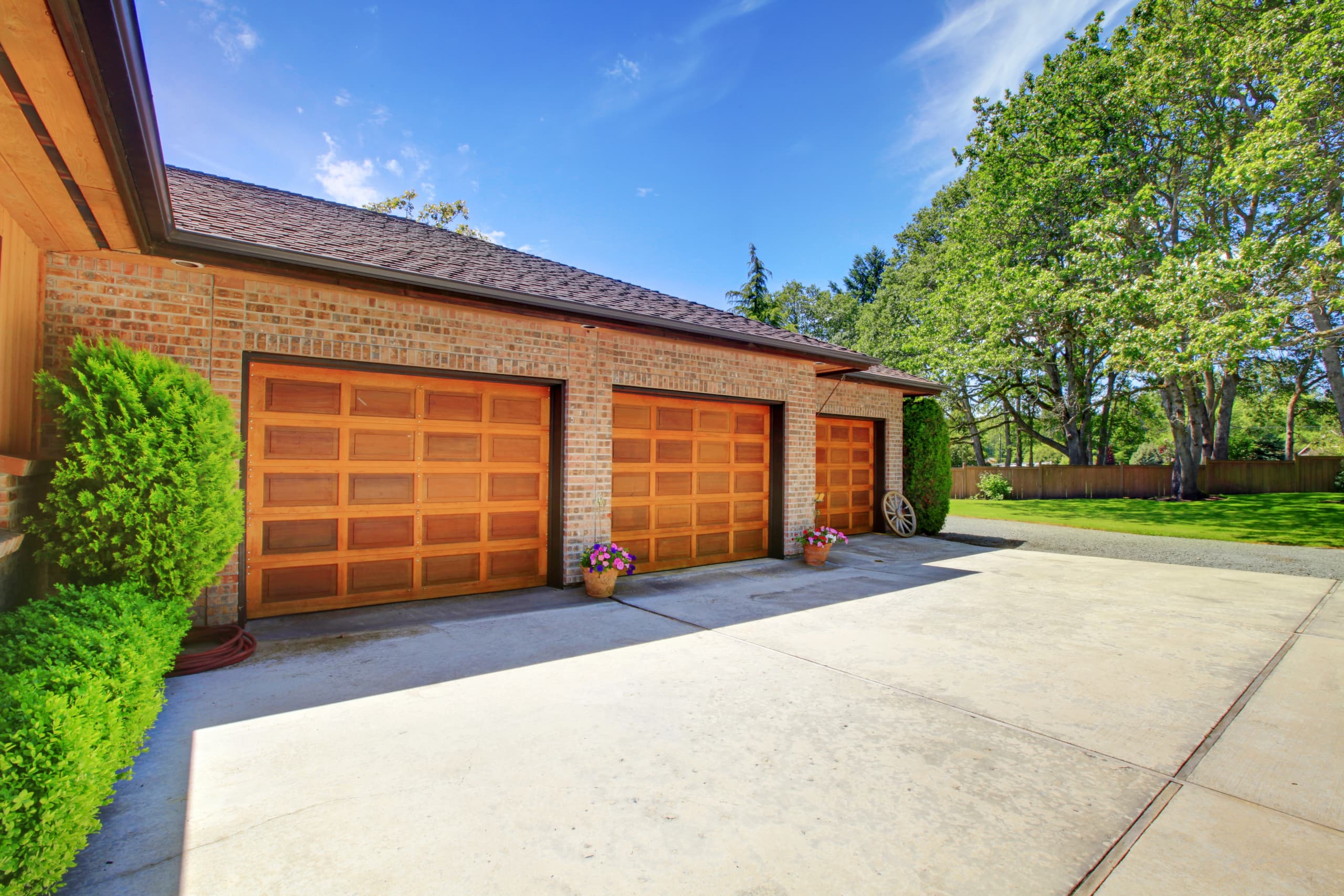Wooden Garage Doors: Is Timber Eco-Friendly?

Wooden garage doors have long been admired for their natural beauty and timeless appeal. However, as homeowners increasingly prioritise eco-friendly building materials, the environmental impact of these fixtures has come under scrutiny. Are wooden garage doors truly an environmentally responsible choice or should we be looking to other materials when installing a new garage door?
Types of Wood Used in Garage Doors
When it comes to wooden garage doors, manufacturers use a variety of timber species, each offering unique characteristics in terms of appearance, durability and environmental impact. Cedar is a popular choice due to its natural resistance to decay and insects, as well as its attractive grain patterns; cypress is another decay-resistant option, often praised for its stability and ability to withstand humid conditions.
For those seeking a more luxurious look, mahogany provides a rich colour and fine grain, though it comes at a higher environmental and financial cost. Domestically sourced woods like oak and pine are also options to consider. Oak offers exceptional strength and a distinctive grain, while pine provides a more affordable option with a rustic appeal.
However, the sustainability of these woods largely depends on their sourcing – for example, some suppliers use reclaimed wood, giving new life to old timber and reducing the demand for freshly harvested trees. Others use wood certified by organisations, ensuring it comes from responsibly managed forests.
Weighing the Environmental Impact
The environmental impact of timber production for garage doors is a complex issue with both positive and negative aspects. On one hand, the harvesting of trees for timber can contribute to deforestation, particularly when it’s not managed sustainably. This loss of forest cover can lead to habitat destruction, reduced biodiversity, and increased carbon dioxide in the atmosphere.
When timber is sourced from well-managed forests, however, it can actually have a positive environmental effect. Trees act as carbon sinks, absorbing and storing carbon dioxide throughout their lifetime. Even after harvesting, much of this carbon remains locked in the wood products.
Many modern timber processing facilities have also made significant strides in reducing their energy consumption and utilising waste products for energy production. The byproducts of timber processing, such as sawdust and wood chips, can be used for biofuel or in the production of engineered wood products, which minimises waste. Additionally, advancements in forestry practices, including selective harvesting and rapid replanting, are helping to mitigate the negative impacts of timber production.
Longevity and Maintenance of Wood
From modern doors to classic looks, wooden garage doors offer exceptional longevity when they’re properly maintained, making for a smart, eco-friendly investment. These natural beauties can last for decades with the proper care – this extended lifespan means fewer replacements over time, reducing the overall environmental impact and resource consumption associated with manufacturing and installing new doors.
Regular care, such as periodic painting or staining, not only preserves the door’s functionality but also allows homeowners to refresh their home’s appearance without the need for full replacement. This maintenance process can be done with eco-friendly products, further enhancing the door’s green credentials. Small dents or scratches in wood can often be easily repaired too to keep the door in great condition for years to come.
How Energy Efficient are Wooden Garage Doors?
Wooden garage doors excel in energy efficiency, offering homeowners a natural solution to temperature regulation. Wood is an excellent insulator in itself, with cellular structures that trap air and slow heat transfer. This inherent property helps maintain a more stable temperature in garages, reducing the energy needed for heating or cooling adjacent living spaces.
In contrast to materials that can quickly heat up in summer or become frigid in winter, wooden doors act as a buffer against extreme temperatures, contributing to overall home energy efficiency.
The insulation properties of wood can be further enhanced through modern manufacturing techniques. Many wooden garage doors are constructed with layered designs, incorporating insulating materials between wood panels to boost their thermal performance. This combination of natural wood and engineered insulation creates a highly effective barrier against heat loss in winter and heat gain in summer.
Looking for Certification and Sustainable Practices
Certification and sustainable practices have become pivotal in choosing sustainable, eco-friendly wooden garage doors. These certifications offer consumers peace of mind when it comes to purchasing a door with a lower environmental impact. The best-known certification comes from the Forest Stewardship Council (FSC), which stands as a gold standard, ensuring that wood products come from responsibly managed forests that provide environmental, social and economic benefits.
Many manufacturers now prioritise FSC-certified timber, allowing homeowners to choose doors that support sustainable forestry practices. This guarantees that for every tree harvested, new ones are planted, maintaining forest biodiversity and longevity. Beyond FSC, other eco-certifications like PEFC (Programme for the Endorsement of Forest Certification) also play crucial roles in promoting responsible wood sourcing.
We partner with carefully chosen manufacturers who consider the sustainability of their products, such as Cedar Door and Woodrite doors which use sustainably sourced wood for their products.
The natural beauty and warmth of wood continue to be unparalleled, adding character and value to homes. More importantly, the environmental benefits of wooden garage doors are significant when considering their entire lifecycle. From the importance of growing trees for carbon capture to the energy efficiency of the finished product, and finally to the biodegradability at end-of-life, wood presents a holistic eco-friendly solution.
To explore the wide range of wooden garage doors we have available, or to browse other materials you might be considering, get in touch with our friendly team today.

